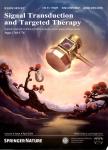Inhibition of pancreatic EZH2 restores progenitor insulin in T1D donor
作者机构:Department of DiabetesCentral Clinical SchoolMonash UniversityMelbourneVictoria 3004Australia Epigenetics in Human Health and Disease LaboratoryCentral Clinical SchoolMonash UniversityMelbourneVictoria 3004Australia Immunology and Diabetes UnitSt Vincent’s Institute of Medical ResearchFitzroyVictoriaAustralia Department of Clinical PathologyThe University of MelbourneParkvilleVictoriaAustralia Department of Medicine and TherapeuticsThe Chinese University of Hong KongSha TinHong Kong SAR Hong Kong Institute of Diabetes and ObesityPrince of Wales HospitalThe Chinese University of Hong Kong3/F Lui Che Woo Clinical Sciences Building30-32 Ngan Shing StreetSha TinHong Kong SAR Li Ka Shing Institute of Health SciencesThe Chinese University of Hong KongSha TinHong Kong SAR Faculty of HealthDepartment of TechnologyBiomedical Laboratory ScienceUniversity College CopenhagenCopenhagenDenmark
出 版 物:《Signal Transduction and Targeted Therapy》 (信号转导与靶向治疗(英文))
年 卷 期:2022年第7卷第8期
页 面:3045-3053页
核心收录:
学科分类:0710[理学-生物学] 1002[医学-临床医学] 10[医学]
基 金:A.E-O.is a National Health and Medical Research Council(NHMRC)Senior Research Fellow(1154650) acknowledges grant funding(2003401,1113188) M.E.C.acknowledges NHMRC(1175760) supported by an Innovation Grant from JDRF International(Grant#1-INO-2022-1123-A-N)。
主 题:EZH2 progenitor donor
摘 要:Type 1 diabetes(T1D)is an autoimmune disease that selectively destroys insulin-producingβ-cells in the pancreas.An unmet need in diabetes management,current therapy is focussed on transplantation.While the reprogramming of progenitor cells into functional insulin-producingβ-cells has also been proposed this remains controversial and poorly understood.The challenge is determining why default transcriptional suppression is refractory to exocrine reactivation.After the death of a 13-year-old girl with established insulin-dependent T1D,pancreatic cells were harvested in an effort to restore and understand exocrine competence.The pancreas showed classic silencing ofβ-cell progenitor genes with barely detectable insulin(Ins)transcript.GSK126,a highly selective inhibitor of EZH2 methyltransferase activity influenced H3K27me3 chromatin content and transcriptional control resulting in the expression of coreβ-cell markers and ductal progenitor genes.GSK126 also reinstated Ins gene expression despite absoluteβ-cell destruction.These studies show the refractory nature of chromatin characterises exocrine suppression influencingβ-cell plasticity.Additional regeneration studies are warranted to determine if the approach of this n-of-1 study generalises to a broader T1D population.



